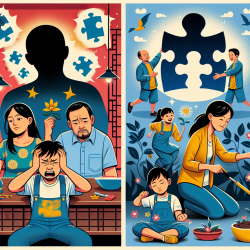Parenting a child with Autism Spectrum Disorder (ASD) presents unique challenges that can significantly impact the emotional well-being of parents. A recent study titled "The Mediating Role of Parenting Stress in the Relations Between Parental Emotion Regulation and Parenting Behaviors in Chinese Families of Children with Autism Spectrum Disorders: A Dyadic Analysis" sheds light on these dynamics. This research provides valuable insights for practitioners working with families affected by ASD.
The Study's Core Findings
The study utilized an actor–partner interdependence mediation model to explore how emotion dysregulation and parenting stress influence parenting behaviors among 211 pairs of Chinese parents of children with ASD. The findings revealed significant indirect effects of parental emotion dysregulation on their own parenting behaviors through their own parenting stress. Interestingly, no direct or indirect partner effects were observed, suggesting that these emotional dynamics occur at an individual level rather than a dyadic one.
Implications for Practitioners
For practitioners, understanding these dynamics is crucial for developing effective interventions. Here are some actionable strategies based on the study's outcomes:
- Focus on Individual Support: Since the study indicates that emotional dynamics are more individual than dyadic, interventions should focus on supporting each parent individually in managing their stress and emotions.
- Emotion Regulation Training: Providing training on emotion regulation strategies can help parents manage stress more effectively, leading to improved parenting behaviors.
- Cultural Sensitivity: Recognize cultural differences in emotion regulation and tailor interventions accordingly. The study highlights the importance of considering cultural contexts when examining emotion regulation.
- Encourage Self-Care: Help parents understand the importance of self-care and provide them with resources to manage their stress levels effectively.
Encouraging Further Research
This study opens up several avenues for further research. Future studies could explore the following areas:
- Crossover Effects: Investigate potential crossover effects where one parent's stress impacts the other parent's parenting behaviors.
- Cultural Comparisons: Conduct cross-cultural studies to understand how cultural differences influence the relationship between emotion regulation and parenting stress.
- Longitudinal Studies: Implement longitudinal studies to examine how these dynamics evolve over time and their long-term impact on family functioning.
Conclusion
The findings from this study provide a deeper understanding of how parenting stress mediates the relationship between emotion regulation and parenting behaviors in families with children with ASD. By implementing targeted interventions focused on individual support and emotion regulation, practitioners can help parents manage stress more effectively, ultimately leading to better outcomes for families.
To read the original research paper, please follow this link: The Mediating Role of Parenting Stress in the Relations Between Parental Emotion Regulation and Parenting Behaviors in Chinese Families of Children with Autism Spectrum Disorders: A Dyadic Analysis.










